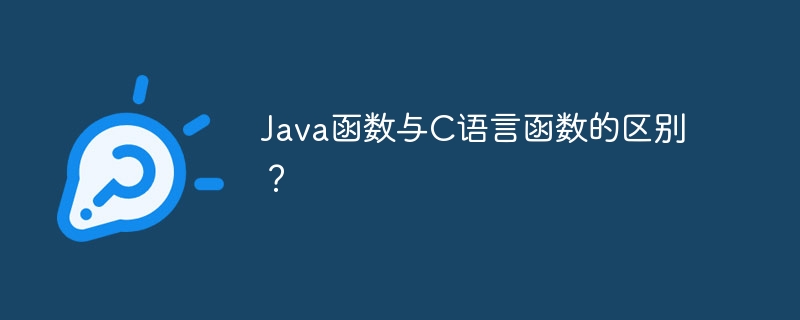What is the difference between Java functions and C language functions?
Apr 23, 2024 pm 06:15 PMThe main difference between Java and C language functions is: Memory management: Java automatically manages memory, while C requires manual allocation and release of memory. Data types: Java has a strict data type system, while C is relatively weak and can lead to errors. Function signature: Java function signature specifies the return value type, while C only specifies the parameter type. Parameter passing: Java uses passing by reference while C uses passing by value for primitive types. Error handling: Java uses exceptions while C uses errno or function return values to indicate errors.

The difference between Java functions and C language functions
Memory management
- Java: Java uses Automatic memory management, no need to manually allocate and release memory. The garbage collector is responsible for releasing objects when they are no longer needed.
- C: C requires explicit memory management. The programmer is responsible for allocating and releasing memory. Improper management can lead to memory leaks or segfaults.
Data Type
- Java: Java has a strict data type system, each variable must declare its type, such as
int,float,String, etc. - C: C has a weak data type system and variables can be implicitly converted to other types, which can lead to errors.
Function signature
- Java: A Java function signature specifies the function name, parameter types, and return value type.
- C: The C function signature only specifies the function name and parameter types, and the return value type is inferred from the function header.
Parameter passing
- Java: Java functions use reference passing, that is, parameters modified in the function will affect the value in the caller.
- C: C functions use value passing for basic type parameters and use reference passing for non-basic type parameters.
Error handling
- Java: Java uses exceptions to handle errors. Different exceptions represent different error types.
- C: C uses the
errnoglobal variable or the return value of a function to indicate errors.
Practical case: Calculate the sum of squares of two numbers
Java code:
public class Main {
public static long sumOfSquares(long a, long b) {
return a * a + b * b;
}
public static void main(String[] args) {
long x = 3;
long y = 4;
long result = sumOfSquares(x, y);
System.out.println(result); // 输出 25
}
}C code:
#include <stdio.h>
long sumOfSquares(long a, long b) {
return a * a + b * b;
}
int main() {
long x = 3;
long y = 4;
long result = sumOfSquares(x, y);
printf("%ld\n", result); // 输出 25
return 0;
}The above is the detailed content of What is the difference between Java functions and C language functions?. For more information, please follow other related articles on the PHP Chinese website!

Hot Article

Hot tools Tags

Hot Article

Hot Article Tags

Notepad++7.3.1
Easy-to-use and free code editor

SublimeText3 Chinese version
Chinese version, very easy to use

Zend Studio 13.0.1
Powerful PHP integrated development environment

Dreamweaver CS6
Visual web development tools

SublimeText3 Mac version
God-level code editing software (SublimeText3)

Hot Topics
 Break or return from Java 8 stream forEach?
Feb 07, 2025 pm 12:09 PM
Break or return from Java 8 stream forEach?
Feb 07, 2025 pm 12:09 PM
Break or return from Java 8 stream forEach?
 Java Made Simple: A Beginner's Guide to Programming Power
Oct 11, 2024 pm 06:30 PM
Java Made Simple: A Beginner's Guide to Programming Power
Oct 11, 2024 pm 06:30 PM
Java Made Simple: A Beginner's Guide to Programming Power
 Create the Future: Java Programming for Absolute Beginners
Oct 13, 2024 pm 01:32 PM
Create the Future: Java Programming for Absolute Beginners
Oct 13, 2024 pm 01:32 PM
Create the Future: Java Programming for Absolute Beginners
 Demystifying C: A Clear and Simple Path for New Programmers
Oct 11, 2024 pm 10:47 PM
Demystifying C: A Clear and Simple Path for New Programmers
Oct 11, 2024 pm 10:47 PM
Demystifying C: A Clear and Simple Path for New Programmers











